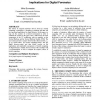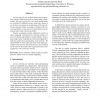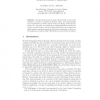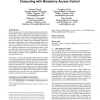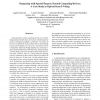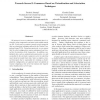COLCOM
2005
IEEE
15 years 7 months ago
2005
IEEE
The trusted computing bases (TCBs) of applications running on today’s commodity operating systems have become extremely large. This paper presents an architecture that allows to...
113
click to vote
SAC
2006
ACM
15 years 8 months ago
2006
ACM
The release of computer hardware devices based on “trusted computing” technologies is heralding a paradigm shift that will have profound implications for digital forensics. In...
106
Voted
CNSR
2006
IEEE
15 years 8 months ago
2006
IEEE
Ad-hoc networks rely on participation and cooperation of nodes within the network to transmit data to destinations. However, in networks where participating nodes are controlled b...
118
click to vote
PKC
2007
Springer
15 years 8 months ago
2007
Springer
Abstract. Direct anonymous attestation (DAA) is an anonymous authentication scheme adopted by the Trusted Computing Group in its specifications for trusted computing platforms. Th...
FOSAD
2007
Springer
15 years 8 months ago
2007
Springer
This article addresses two main topics. Firstly, we review the operation of trusted computing technology, which now appears likely to be implemented in future mobile devices (inclu...
103
click to vote
CCS
2007
ACM
15 years 8 months ago
2007
ACM
Usage controls allow the distributor of some information to limit how recipients of that information may use it. The Trusted Computing Group has standardized Trusted Platform Modu...
112
click to vote
CCS
2007
ACM
15 years 8 months ago
2007
ACM
The increasing number of software-based attacks has attracted substantial efforts to prevent applications from malicious interference. For example, Trusted Computing (TC) technolo...
116
click to vote
ACSAC
2007
IEEE
15 years 8 months ago
2007
IEEE
Special purpose trusted computing devices are currently being deployed to offer many services for which the general purpose computing paradigm is unsuitable. The nature of the ser...
118
click to vote
IEEEARES
2008
IEEE
15 years 8 months ago
2008
IEEE
We present a secure e-commerce architecture that is resistant to client compromise and man-in-the-middle attacks on SSL. To this end, we propose several security protocols that us...

